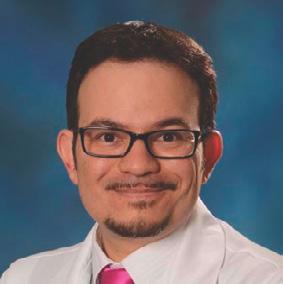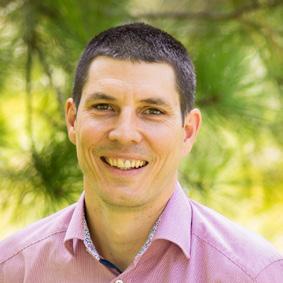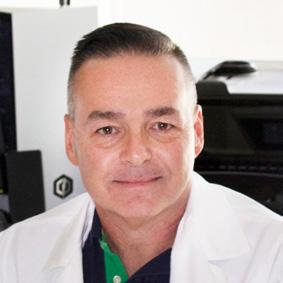
16 minute read
Commercialization
The path to commercialization has been a focus for the Gates Center from the very beginning. 2020 proved a seminal year as Gates Center member David Wagner, Ph.D., became the first Gates Grubstake Fund awardee at the starting gate to launch a clinical trial scheduled to begin in February 2021 (see
Dr. Wagner’s profile on page 36).
Following the Gates Frontiers Fund’s generous funding of two promising Gates Center members in 2014, the Gates Grubstake Fund (GGF) was incorporated as a private 501(c)(3) foundation in 2015 to advance innovative ideas with potential for commercial application in the field of regenerative medicine or stem cell technologies. Since then, funding has been awarded on a competitive basis to promising investigative teams whose research may lead to new therapies, commercial devices, technologies, or even spin-off companies.
The Gates Grubstake Fund’s name comes from the Gold Rush, when investors would give prospectors seed money known as “grubstakes” to buy food and supplies while they searched for gold. Similarly, academic researchers focused on developing new therapies or devices with commercial potential are in critical need of gap funding while they work on product development.
THE PATH TO COMMERCIALIZATION
SCIENTIFIC DISCOVERY & VALIDATION PRODUCT DEVELOPMENT CLINICAL DEVELOPMENT
REGULATORY STRATEGY
BUSINESS MODEL FINANCIAL PLAN
CORPORATE FORMATION BUSINESS DEVELOPMENT
ACADEMIC FUNDING GATES GRUBSTAKE FUND
STARTUP TOOLBOX
STARTUP/ LICENSE
CLINICAL TRIALS MARKET
FDA & REIMBURSEMENT APPROVALS
INVESTMENT FUNDING PUBLIC & PRIVATE
The Gates Grubstake Fund aspires to fill that funding gap for promising projects and has traditionally supported three to four annual awards of up to $350,000. That money can be spent on product development-related expenses, which would not be permissible with a traditional federal grant. And the Fund’s success has been remarkable. Its initial investment of $6 million in Grubstake projects from 2014-2020 has resulted in seven pre-IND (investigational new drug) applications to the FDA and three IND/IDE (investigational device exemption) packages in preparation, in addition to Dr. Wagner’s Phase 1a clinical trial scheduled for early 2021. Further, five companies have been spun out, and follow-on funding from grants, charities, or investment has exceeded $35 million.
The Gates Grubstake Fund owes its success not only to the Gates Frontiers Fund that has made these generous awards possible, but also to the impressive Scientific Investment Advisory Committee (SIAC), which makes investment decisions on a competitive basis through a process overseen by the Gates Center and CU Innovations. The SIAC is comprised of subject matter experts and institutional investors with a focus on biotechnology, and the list of members includes Sibylle Hauser and Mani Mohindru, whom we enthusiastically welcomed to the committee this fall. We have also included the late Will Hiatt, M.D., who served as a brilliant, dedicated and influential member of the Gates Center Advisory Board and this committee from the very beginning. Though Will sadly passed away in December, those present at the Grubstake pitch presentations in November may always remember his invaluable and rigorous participation in this year’s award process, after which he wrote:
“I always learn a lot sitting on this committee – most prior grant reviews for NIH and others just focus on the science, but Grubstake represents a diversity of expertise on the committee that is quite extraordinary! Indeed - the whole Gates programs on campus are a real gift and opportunity!”
Members of the SIAC and 2020 Gates Grubstake Fund awardees are listed below.
• Mark Brunvand, M.D., Field Medical Director, CAR T-cells, Bristol-Myers Squibb • Sibylle Hauser, Strategic Advisor – Life Science, Richtr Financial Studio • William Hiatt, M.D.,* Professor, Division of Cardiology, University of Colorado Anschutz Medical Campus;
Past President and Chief Science Officer, CPC Clinical Research, member, Gates Center Advisory Board • Ryan Kirkpatrick, Partner, Colorado Impact Fund • David L. Lacey M.D., Biopharmaceutical Consultant, former Senior Vice President, Head of Research, Amgen • Mark Lupa, Ph.D., Principal, High Country Ventures • Mani Mohindru, Ph.D., Senior Biotech Executive • Kimberly Muller, J.D., Managing Director, CU Innovations, University of Colorado Anschutz Medical Campus • Mark Petrash, Ph.D., Professor and Vice-Chair, Department of Ophthalmology, Associate Director,
Gates Center for Regenerative Medicine, University of Colorado Anschutz Medical Campus • Matthew Seefeldt, Ph.D., Executive Director, Gates Biomanufacturing Facility • Geoff “Duffy” Solich, Executive Vice President, E & P Resources LLC; member, Gates Center Advisory Board • Ann Sperling, Senior Director, Trammell Crow Company; member, Gates Center Advisory Board • Robert Traver, J.D., Patent Attorney, Sheridan Ross
It is an honor to be affiliated with the Gates Center for Regenerative Medicine. I look forward to working to help advance the Center’s mission of accelerating innovative discoveries from the lab to therapies and cures. ~Mani Mohindru, Ph.D. I am very honored to have been selected to serve on the Scientific Investment Advisory Committee in 2021 and will do my part to support advancing the most promising regenerative medicine projects which will potentially impact so many lives.” ~Sibylle Hauser

2020 GATES GRUBSTAKES AWARDEES
Dr. Ulli Bayer, a Professor in the Department of Pharmacology at the University of Colorado Anschutz Medical Campus, is also the CSO of Neurexis Therapeutics, a startup out of the University of Colorado. Dr. Bayer received a Grubstake Award to perform animal testing of an optimized peptide therapeutic in a mouse model of ischemic spinal cord damage. The therapeutic has already been shown to have activity in animal models of global cerebral ischemia and to have no apparent safety concerns at the highest doses tested. The number of patients at risk for ischemic spinal cord damage is 15,000 per year, while follow on indications of global cerebral ischemia and stroke are 550,000 and 800,000 per year, respectively. This funding will accelerate development toward pre-IND filing with the FDA.
Eduardo Davila, Ph.D. “Manufacturing of Genetically Engineered Tumor Infiltrating Lymphocyte Therapy”
Dr. Eduardo Davila, a Professor in the Department of Medicine and the Amy Davis Chair of Basic Immunology Research, is the Director, Immunotherapy Medical Oncology and Director, Cancer Research Training and Education at the University of Colorado Comprehensive Cancer Center at the Anschutz Medical Campus and CEO of TrAMPoline, a startup company out of the University of Maryland. Dr. Davila received a Grubstake Award to develop the manufacturing process for next generation tumor infiltrating lymphocyte (TIL) therapy at the Gates Biomanufacturing Facility. TIL therapy fills an important unmet medical need for the treatment of the 1.5 million new cases of solid tumors each year as more than 50% of patients relapse or do not respond to current immunotherapy. This funding will accelerate development toward pre-IND filing with the FDA.

Dr. Michael Zuscik, the Mack Clayton Professor of Orthopedics and Vice Chair of Research, received a Grubstake Award to perform animal testing of a chondroregenerative peptide therapeutic for the treatment of osteoarthritis. Osteoarthritis is the most prevalent disease in the U.S., with 32 million patients diagnosed. The financial burden of disease is $185 billion, with lost wages and reduced productivity resulting in a financial toll of more than $300 billion. Dr. Zuscik’s prior work with another peptide, Forteo, that binds to the same receptor has shown positive interim results in a prospective double blind clinical trial. The Grubstake funding will drive the decision of whether to develop abaloparatide for the treatment of osteoarthritis.

In 2020 the SIAC also recommended that additional available funding be deployed to accelerate translation to the clinic of previously funded projects that have made significant progress and that need additional funding to achieve a significant inflection point.
2020 2ND TRANCHE GRUBSTAKE FUNDING RECIPIENTS
Ken Liechty, M.D. “Conjugated Nanoceria to Treat Inflammatory Disorders Including Pulmonary Fibrosis”
Dr. Kenneth Liechty is the Sandy Wolf Chair in Maternal Fetal Surgery and Director of the Colorado Fetal Care Center for Children’s Hospital at the University of Colorado
Anschutz Medical Campus. Dr. Liechty has received two Grubstake Awards to develop his conjugated nanoceria therapeutic for the treatment of diabetic foot ulcers and ARDS and has filed pre-IND applications with the FDA for both indications. The second tranche of funding is designed to enable further manufacturing at the Gates Biomanufacturing Facility in preparation for IND filing with the FDA.

Holger Russ, Ph.D. “Generation of Functional Patient Specific Thymii for Cell Therapy”
Dr. Holger Russ is an Assistant Professor, Pediatrics in the Barbara Davis Center at the University of Colorado Anschutz Medical Campus. Dr. Russ used funds from the original Grubstake Award to develop and streamline his process for developing a patient specific thymus in the lab. His ground-breaking research has elicited interest from industry who have requested some final proof of concept studies. The second tranche of funding will answer the questions posed by industry and guide decision-making around patient benefit and commercialization.

David Wagner, Ph.D. “Therapeutic for Myelin Loss/Regeneration in Multiple Sclerosis”
Dr. David Wagner, an Associate Professor, Medicine – Pulmonary Sciences & Critical Care and Head, Immunology Section, is also the CSO of Op-T, LLC, a startup out of the University of Colorado Anschutz Medical Campus. Op-T, LLC is beginning a Phase 1 clinical trial at UC Health for the treatment of type 1 diabetes using a therapeutic peptide, OPT101, developed in part using the original Grubstake Award. The second tranche of funding is designed to develop the second-generation formulation of the therapeutic peptide and demonstrate its activity in animal models of type 1 diabetes and multiple sclerosis in preparation for additional IND filings with the FDA.
DEVELOPMENT STAGE AWARDEE PROJECT NAME
Michael Zuscik, Ph.D.
Holger Russ, Ph.D. Abaloparatide as the First Chondroregenerative Therapy for Osteoarthritis
Generation of functional, patient specifi c thymi for cell therapy
In Vivo Rodent
Non-Rodent
Antonio Jimeno, M.D., Ph.D Proprietary Humanized Mouse Model to Assess Cancer Treatments
Michael Verneris, M.D.
Kunhua Song, Ph.D.
Eduardo Davila, Ph.D.
Raj Kumar, Ph.D. Generation of Engraftable Hematopoietic Stem Cells from Induced Pluripotent Stem Cells Heart Regeneration by Conversion of Non-Myocytes into Functional Cardiomyocytes
Manufacturing of Genetically Engineered Tumor Infi ltrating Lymphocyte Therapy
Production of Effi cacious Recombinant hypo-glycosylated FSH Glycoform for Clinical Applications
Valeria Canto-Soler, Ph.D.
Karin Payne, Ph.D.
Ulli Bayer, Ph.D. Stem Cell-Derived Retinal Transplant to Treat Dry-AMD
Bioresorbable 3-D Printed Personalized Implant for Cartilage Regeneration in Pediatric Growth Plate Injuries
Pharmacological Restoration of Ischemic Spinal Cord Damage
Xiao-Jing Wang, M.D., Ph.D Fusion Protein to Treat Chronic Wounds and Infl ammatory Disorders
Pre-Clinical Pre-IND
Steven Dow, DVM, Ph.D. Antimicrobial Stem Cell Therapy for Infected Diabetic Foot Ulcers
Ganna Bilousova, Ph.D. and Igor Kogut, Ph.D. Induced Pluripotent Stem Cell Services as a Platform for Clinical Research
Martin Zamora, Ph.D. Clinical Development of Autologous CD117+ Progenitor Cell Therapy for Solid Organ Transplantation
Ram Nagaraj, Ph.D.
Kenneth Liechty, M.D. Therapeutic peptide for neuroprotection in acute closed angle glaucoma
Conjugated Nanoceria to Treat Oxidative Stress and Prevent Chronic Infl ammation
IND/IDE
Jeffrey Olson, M.D.
Kenneth Liechty, M.D.
Terry Fry, M.D.
Clinical Trials Phase 1 David Wagner, Ph.D. Intraocular Device to Potentiate Retinal Stem Cell Transplantation in Macular Degeneration
Prevention and Treatment of Pulmonary Fibrosis
Optimized manufacturing of CD19xCD22 CAR expressing T cells for the clinic
A 15-Amino Acid Peptide to Potentially Stop Demyelination and Restore Myelin Production in Multiple Sclerosis
AWARD YEAR
2020
2019
2014
2018
2018
2020
2019
2017
2017
2020
2014
2015
2015
2017
2019
2016
2016
2018
2019
2016

STARTUP TOOLBOX BRIDGES CRUCIAL GAP
Similar to the Gates Grubstake Fund, the Startup Toolbox program was established to bridge a crucial gap for Gates Center members focused on moving discoveries from the lab into products and services that will impact patients. Gates Center Advisory Board member Ann Sperling has served on the Gates Grubstake Fund’s Scientific Investment Advisory Committee from the beginning and as such, has reviewed and recommended awards for promising regenerative medicine opportunities. Nonetheless, she also recognized the need to help researchers when they need assistance outside of the science to build a business plan, or access intellectual property (IP), legal/regulatory help, pricing etc.

In 2017, Ann creatively conceived and generously funded Startup Toolbox as another partnership between the Gates Center and CU Innovations focused on commercialization. The novel platform contains services and resources that include corporate/legal, product development, regulatory, Small Business Innovation Resources (SBIR) consultants, as well as business plan and financial modeling support. Ann explains, “It attracts me because as a businessperson, I see the need to get these great scientific ideas into action through financial and organizational transformation, too, and access to this platform of services addresses this essential, nonscientific part.”
To date, Startup Toolbox has been funded by Ann Sperling, Anita and Geoffrey “Duffy” Solich and others and has helped
SIAC member Ann Sperling conceived and funded Startup Toolbox.
advance 16 projects that have received funding and pro bono support in regulatory strategy, corporate formation and business development. This has led to two new Colorado startups, and enabled researchers both to work with the Gates Center’s affiliated Gates Biomanufacturing Facility and to plan for clinical trials at UC Health.
According to CU Innovations Executive Director Kimberly Muller, who also serves on the Gates Grubstake Fund’s SIAC, “The Gates Center’s success through the Gates Grubstake Fund and Startup Toolbox programs has showed us how we can support the very best ideas on their path towards clinical application. In fact, these programs have inspired CU Innovations to adopt similar models to support CU Anschutz researchers in areas outside of regenerative medicine as well.”
David Wagner, Ph.D., first Gates Grubstake Fund Awardee to begin a clinical trial

GATES GRUBSTAKE FUND AWARDEE, DAVID WAGNER, LEADS THE WAY TO CLINICAL TRIALS
Dr. David Wagner’s journey to the Gates Center and the University of Colorado Anschutz Medical Campus began in the far northeast corner of Tennessee where he grew up. On his way west, he lost his southern accent to present his impressive scientific findings, but he maintains close family ties and pride in his Appalachian roots. He now wears numerous hats he never envisioned. On the Anschutz Medical Campus, he is a Senior Investigator and Head Section of Immunology at the Webb-Waring Center and Associate Professor in the Department of Medicine - Pulmonary Science & Critical Care Medicine. He is also the Chief Scientific Officer for Op-T, LLC, a biotech startup he co-founded, developing diagnostics for autoimmune diseases and therapeutic approaches to control autoimmune inflammation. Recently, he joked that he now wears a pharmacologist’s hat, as well, without the benefit of formal training. He is beginning first-in-human clinical trials with a drug he designed to benefit patients suffering from type I diabetes (T1D)—a drug that also has applications for multiple sclerosis (MS) and potentially atherosclerosis, along with severe cytokine responses in acute respiratory distress syndrome (ARDS) and COVID-19.
As a child, Dr. Wagner leaned towards medicine and science. He was born with an inguinal hernia only discovered when he was in third grade by a surprised doctor who promptly coordinated surgery to remedy the situation. This formative experience drew him towards medicine. However, once exposed to scientific research, he found his true calling. After receiving a Ph.D. from East Tennessee State University, Dr. Wagner moved to Colorado for a Postdoctoral Fellowship at National Jewish Health. He later received a Senior Postdoctoral Fellowship at the Barbara Davis Center for Diabetes followed by positions with Webb-Waring and the School of Medicine, where understanding how autoaggressive T cells cause autoinflammation in T1D and other diseases has become his focus. In addition to his research, he has served as a board member and president on a regional community leadership board for the American Diabetes Association. In this capacity, he worked with doctors, nurses, physician assistants, and patients, and these interactions have kept the immediacy of patient needs and issues front and center.
Since 2014 when the Gates Center launched the Gates Grubstake Fund, 21 Grubstake awards have been directed towards talented scientists with promising research discoveries to accelerate the development of viable products and technologies for human benefit. In 2016, Dr. Wagner received a Grubstake Award to develop a platform technology licensed to his company Op-T, LLC and designed to treat autoimmune diseases by modulating aberrant immune signaling. Significantly, Dr. Wagner is the first Grubstake
awardee to advance his research and proprietary peptide to first-in-human Phase 1 clinical trials. Speaking of the Gates Center role in advancing his research toward this milestone, Dr. Wagner maintains,
The Gates Center really has been most valuable. One of the tricky parts for people like me is how to keep the academic lab work going while balancing the company work. The Gates Grubstake Fund grants have provided much-needed funds that facilitate that important bridge. The academic lab work is essential for the company’s progress.
be a member of the Gates Center.” Funding from the Gates Grubstake award and assistance from the Gates Center has made a big difference, and seminars, coursework on business development, mentorship, and connections have been invaluable. He has also benefitted from having conversations with fellow members discussing how to navigate roadblocks and avoid potential pitfalls in drug development.
The COVID-19 pandemic added unexpected hurdles to launching his clinical studies. Early in 2020, Op-T, LLC filed an Investigational New Drug application (IND) with the FDA to use his proprietary peptide to treat T1D. At the onset of the pandemic, no one was willing to risk initiating clinical trials.
Dr. Wagner will initially employ the Op-T, LLC drug, OPT101, (developed in part with Grubstake funding) in clinical trials for T1D. His 15 amino acid therapeutic peptide is a molecular interrupter. It targets and modulates cells that are highly inflammatory in autoimmune diseases. Some current clinical approaches to T1D involve monoclonal antibodies (MCAs), which can be effective. But MCAs target cells to die. When targeting immune cells, modulating (and in this case, downmodulating) can be more effective, allowing the immune system to regroup and reconfigure. There are many other diseases, like MS, that may also benefit from this approach. Pending positive results from this first clinical study, Dr. Wagner is eager to apply OPT 101 to MS. There is a real need for such a drug, and he notes that Colorado has a high incidence of MS. Through all of this, Dr. Wagner says he is “thrilled to
2020 was just a kick in the teeth. We received FDA approval, technically a “Safe to Proceed” letter on our IND (Investigational New Drug) application, on April 13, 2020. This was once Shut Down had commenced; this changed everything. Trying to schedule any sort of clinical trial was impossible … the only option was to wait ... and wait.
By the end of 2020, it was back to “all systems go” along with much hope and optimism. Phase 1a clinical studies were scheduled to begin in February 2021 with three patients, and Dr. Wagner was awarded “second tranche allocation funding” from the Grates Frontiers Fund directed toward improving his drug delivery method for the current clinical trials and expanding his studies to MS.











